Commentary
The Chevy Bolt
Those early purchasers of the Chevy Bolt, who are now experiencing a major recall relating to battery fires, are reasonably upset over General Motors’ decision to reduce its price on the EV by $6,000 in its bid to make the 2023 model more appealing.
In response, GM has extended the $6,000 deal to those purchasers of 2020-2022 models as a rebate, but, but … wait for it … they have to sign a waiver to the right to sue if they experience a thermal runaway and their garage is burned down, or some other catastrophic event takes place.
Biden’s Inducement
In addition to the $7,500 credit for purchasing an American Union-made electric vehicle, the proposed Inflation Reduction Act calls for a new $4,000 tax credit that would be available to purchasers of used EVs.
Recognizing that only well-heeled individuals can afford an EV with an average price tag of $56,000, the Act states that only couples who earn less than $300,000 a year or individuals who earn less than $150,000 a year will be eligible for the credits.
Corporate Welfare
In an effort to jump start the market for electric cars, Biden’s Energy Department is loaning to a General Motors joint venture $2.5 billion to fund the construction of three battery-cell factories in Ohio, Tennessee and Michigan in collaboration with LG Energy Solution, a South Korean battery company.
This is just the latest over the $8 billion in loans already made to Ford, Nissan and Tesla. The yet to be passed Inflation Reduction Act calls for $20 billion for clean vehicle manufacturing and more funding for those electric car rebates.
How About a Highway Use Tax?
Anticipating the impact of the loss of federal and state gasoline and diesel fuel taxes as more EV’s are sold, legislators are busily reviewing plans to track your mileage and tax you on the number of miles you drive.
Few people are aware that the Department of Transportation was authorized to launch a pilot test program to test ways to collect fees in the so-called Infrastructure Investment and Jobs Act. Tests have been funded for Minnesota, Iowa and Nevada.
They’re looking at ways to access location data from third-party on-vehicle devices, smart phone apps and telemetric data collected by automakers, data collected by insurance companies and other methods considered “appropriate” by the Secretary of Transportation Pete Buttigieg.
Americans see it as a privacy matter that can reveal what people do, who they’re with, where they worship, what medical procedures they’re having, their recreational habits, and more. What happens to the data once collected? Minnesota DOT officials noted a lack of trust in a tech-enabled state, adding that they don’t want the government to have their travel or personal information.
You may recall that in 2012 the Supreme Court ruled 9-0 that police could not place a GPS device on a suspect’s car without a warrant, stating that it was an unreasonable search that violated the Fourth Amendment.
Stay tuned.
Cold Weather Concerns
Colorado reported in April that there were nearly two million vehicle registrations, of which 51,645, about three percent, were EV’s. Since a number of them were bought by the state government, the consumer popularity is unknown.
In a cold weather test by Consumer Reports, the Tesla Model 3 and the Nissan Leaf each lost 40 percent of their range in zero to 10 degrees Fahrenheit in Connecticut. Coloradans view cold weather as a big drain on EV performance and EV’s are considered a hard sell there.
Truth vs Fantasy
While the Biden administration is all caught up in what they term an “incredible transition” to a carbon-free energy future, economist Mark Perry notes that nearly two thirds of current U.S. electricity is generated by coal and natural gas, and that figure rises to 86 percent when nuclear power is included.
In a little-reported document from Volvo, the company revealed that EV’s are more material-intensive than old-fashioned gasoline-powered cars, requiring more steel, aluminum and copper, and other rare earth minerals and specialty products like magnets, and the lithium for batteries.
To top it off, the manufacturing process for EV’s is much more energy-intensive.
Interestingly, Volvo calculated that the owner of its C40 electric car would need to drive 68,000 miles to reach a break-even carbon footprint with a gasoline-powered model. That would be five years based on the estimated 14,000 miles driven annually on average.
Finally … ponder this:
“… the greatest threat to progress in the critical realm of climate … comes from the energy and climate initiatives promoted by the Biden White House, which are themselves unsustainable, so aggressive and unduly optimistic that they risk a backlash that would set back the cause of environmental sustainability for generations.
“To avert this, the administration must shift to a more pragmatic set of policies. Encouraging more natural gas production and a moonshot approach to fusion energy would embolden America to lead toward a green future.” – Stuart Gottlieb, Columbia University
Thinking optimistically … an overwhelming Republican victory in the midterms would return sanity to energy production in the United States.






